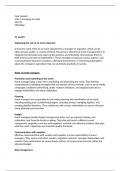Essay
UNIT 4 FULL PACK DISTINCTION GRADED PIECE
- Institution
- PEARSON (PEARSON)
THIS IS UNIT 4 MANAGING an event and covers the assignement 1 task of P1 P2 M1 D1. I received a DISTINCTION grade for this piece of coursework as well as the other pieces of coursework that i have uploaded, so please feel free to message me for any tips Good luck!
[Show more]



